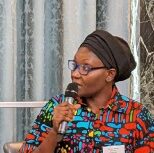At the 2025 International Conference of the Renewable Energy and Energy Efficiency Association Alliance (REEEA-A), Executive Director of the Centre for 21st Century Issues, Barr. Titilope Akosa, urged renewable energy advocates and investors to design projects that align with the real needs and lifestyles of Nigerian communities, rather than importing one-size-fits-all solutions.
Speaking during Panel Discussion V: Communicating Transition – Media and Public Engagement, Akosa highlighted the mismatch between many renewable energy interventions and the realities of ordinary Nigerians.
“We must first identify our priorities and truly know the people in each community. A rural woman will not abandon her clay pot of 20 years just because you gave her a solar cookstove that only fits a special pot. That is not realistic,” she said.
Akosa explained that poverty shapes energy choices. A solar stove, however efficient, will fail if people can get firewood or local lighters for as little as ₦15. “We can talk from morning till night, but if people cannot afford it, they will not listen,” she added.
She called for “a day in the life” assessments of communities to better understand daily routines, from cooking habits to nighttime lighting, so that products are tailored to actual needs. According to her, communities should not be treated as passive recipients but as stakeholders.
“If a community member knows he has a stake in your business and will earn dividends, he will promote your product more than you ever could. Nigerians don’t just want freebies; they want business opportunities that can lift them out of poverty,” she noted.
Akosa emphasized the importance of continuous engagement rather than one-off consultations. Communities evolve, she said, and so do their energy needs. Without ongoing dialogue, investments risk failure.
She also pointed to the absence of a community energy policy in Nigeria, stressing the need for frameworks that support community-led and community-owned projects.
On communication, Akosa urged stakeholders to tailor messages to different groups: investors want solid documentation and proof of capacity; young people respond to visuals and social media trends; while rural dwellers need simple demonstrations that show immediate benefits.
“If you’re talking to rural women, you must show them how a solar lamp can give their children light at night. If you’re talking to investors, they want to see your financials. The messages cannot be the same,” she explained.
Akosa recalled a research trip where community members presented her with locally named kerosene lamps and traditional fire sources, underscoring how deeply rooted local practices are. “You must understand those local realities and use them to solve their problems,” she said.
Her conclusion was clear: energy transition communication must be people-centered, context-sensitive, and business-smart if it is to succeed in Nigeria.

